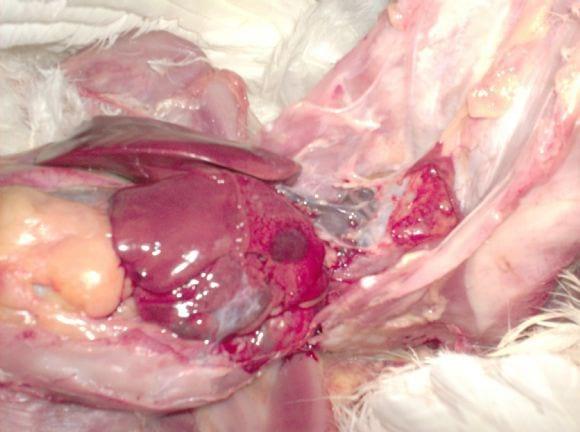Mycoplasma synoviae and Escherichia coli
Forum: Mycoplasma synoviae and Escherichia Coli infection
Pictures are from a 40 weeks old parental flock. Mycoplasma synoviae and Escherichia Coli infection appeared around 37th week. Deaths are approximately 1%, and spot bleeding around rib sheaths and drumstick and breasts muscles also appeared. Egg production is not reduced yet, and the quality of eggs is still good. I am starting to think that the problem has something to do with food, but I do not know how to fix it.
If anyone has experienced a similar problem, I would be grateful if I could get some advice.
Best regards, Danka
View entire photo album, click here
Hello Danka,
I´ve also seen such a problem during a technical support trip to Ukraine.
The source of this infection is a hygienic problem. This agent is mostly transmitted via aerogen routes, if somebody was in flock or has poultry at home so that mycoplasma comes into an intact flock. E. coli is always present and infections appear after Mycoplasma invasion. Normally you should treat it with wide-spread antibiotics...or kill the flock. Leave the house empty for at least 3-4 weeks and vaccinate the next flock with inactivated vaccines.
Dimitri Radko
I think that case causes by:
1-defernet of flock temperature.
2-after vaccination by live vaccine.
3-aflatoxine in food do depression of imminuo system and mycoplasma appear.
4-complication of mycoplasma =Escherichia Coli infection
- you should treat with wide-spread antibiotics
-as prevention use tylosin every 21 days' medicate with it for 3 days
Dear Dmytro,
Thank you for your comment. I am sure it is a technological lapse, as usual with these problems. This time I solved the problem with antibiotics, the following flock will surely be vaccinated and if anyone is experienced with vaccination of heavy parents against mycoplasma I would like to hear about the program that was successful.
Particular problem with this farm is the fact that it is simultaneously populated with two different age groups, so if anyone has experienced vaccination in such conditions it would be valuable for me to read.
Thank you,
Danka.
HI
I think the best way to protect the flocks from such as nasty combination is to protect the parent flocks from MS and MG infection. The best way by far is vaccination against Ms with Vaxsafe MSH and against Mg with Vaxsafe TS-11. Using these vaccines must be at as early age as possible to (after 4 weeks) to prevent reinfection of Mg / Ms negative flocks with field starins. Usually No antibiotic is needed when you vaccinate your flock with these vaccinessince the incidence of such infection almost become zero. and if colibacillosis (alone) occurs Amoxycillin would be enough or you may be able to control it by looking at your biosecurity.
Reza . F. Firooz DVM MVSc
Austral Medi Vet Pty Ltd
Australia



Strategic Care for Chicken in Cold Weather: Combating Poultry Viral Diseases
As photograph there are two solution
1. Immediate solution : According to your law is it restricted or not In Nepal we are trying by injecting this solution
gentamicin 100 ml Amikamycin 20ml Vitamin E 12 ml Vitamin B complex 38 ml Mix it and inject 0.56ml daily for three days followed by Tylosin tartrate 100% 54gm orally for 3 days
2. Permanent solution : empty shed for 3 month regular use of water sanitizer use acidifier in feed vaccinate with E coli and mycoplasma gallisepticum and M. synovae,strict quarentine protocal should be followed
Thanks

Dr German Mercado.
Both vaccines are secure.I have to mention that olders flocks not vaccinated because of diferents age situation in same premise will be good to considere antibiotics against mycoplasma every 4 wks until gone in order to best control exposure. Thanks.
Treat using antibiotics like tylosin, a combination of Tetraclyine, neomycin and chloramphenicol for 5 days. One way to control it by vaccination of bird and practices high standard of biosecurity in poultry farm . if you vaccinate and treat without observing strong boisecurity it will continue to be a problem for you
.jpg&w=3840&q=75)

Jonathan Cade comments on his new role as Chairman of the U.S. Poultry & Egg Association

Hi Dr. Danka. As you may know, the mycoplasma alone perhaps does not cause obvious problem as soon it appears but when another stress factors joins as any infection virus or bacterial the mortality begin to elevate as you mention that you isolat E.Coli,when did you vaccinate your flock ? because when we vaccinated with attenuated strain -there is some things that must be in consideration that firstly the flock must be free from M. sometimes this attenuated strain changed to variant this flurring up the problem... what about the level of biosecurity-age differences between flocks-the way of transmission of infection?
Dear Danka,
Vaccines against mycoplasma spp. works well only where the breeder flocks are reared in all-in-all-out system. In multiage flocks on a single location it is better to follow TIAMULIN HUDROGEN FUMARATE schedule right from the first week.
Also the live vaccines should only be given to the chicks that are free from mycoplasma.
Interesting discussion and thanks Danka for sharing with us.
Has anyone looked into the possibility of using thin coatings on the walls and roof of poultry sheds to remove bacteria and viruses from the air? See www.ingeniatouch.com for the idea better explained (for Healthcare). I will forward a presentation from a Germany company if anyone is interested.


Bacillus amyloliquefaciens CECT 5940 (Ecobiol®) alone or in combination with antibiotic growth promoters improve performance in broilers under enteric pathogen challenge
























